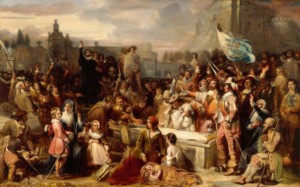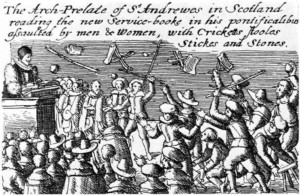
Allan, William; The Signing of the National Covenant in Greyfriars Kirkyard, Edinburgh; City of Edinburgh Council; http://www.artuk.org/artworks/the-signing-of-the-national-covenant-in-greyfriars-kirkyard-Eedinburgh-93072
The Covenanters were those people in Scotland who signed the National Covenant in 1638. They signed this Covenant to confirm their opposition to the interference by the Stuart kings in the affairs of the Presbyterian Church of Scotland.
The Stuart kings harboured the belief of the Divine Right of the monarch. Not only did they believe that God wished them to be the infallible rulers of their kingdom – they also believed that they were the spiritual heads of the Church of Scotland. This latter belief could not be accepted by the Scots. No man, not even a king, could be spiritual head of their church. Only Jesus Christ could be spiritual head of a Christian church.
This was the nub of the entire Covenanting struggle. The Scots were, and would have been, loyal to the Stuart dynasty but for that one sticking point, and from 1638, when the Covenant was signed, until the Glorious Revolution – when Prince William of Orange made a bloodless invasion of Great Britain in 1688 – a great deal of suffering, torture, imprisonment, transportation and executions would ensue.
King Charles I had introduced the Book of Common Prayer to Scotland in 1637 to the fury and resentment of the populace. He declared that opposition to the new liturgy would be treason, and thus came about the Covenant.

Riot depicted following a reading from the Anglican prayer book
There followed a period of very severe repression. Ministers with Covenanting sympathies were “outed” from their churches by the authorities, and had to leave their parishes. Many continued to preach at “conventicles” in the open air or in barns and houses. This became an offence punishable by death. Citizens who did not attend their local churches (which were now in the charge of Episcopalian “curates”) could be heavily fined, and such offenders were regarded as rebels, who could be questioned, even under torture. They could be asked to take various oaths, which not only declared loyalty to the king, but also to accept his as head of the church. Failure to take such an oath could result in summary execution by the muskets of the dragoons, who were scouring the districts looking for rebels.
The persecutions became more frequent and cruel on the Restoration of Charles II in 1660. As time went on more and more ordinary folk became involved, and skirmishes and battles took place against Government troops. In 1678 the Government raised an army of 6,000 Highlanders (the ‘Highland Host’), who had no love for the Presbyterian lowlanders. This army swept through the west and south of Scotland, looting and plundering. These times were called the Killing times.
Robert Naismith in his book “Stonehouse Historical and Traditional” dedicates a full chapter consisting of 18 pages on the covenanters associated with Stonehouse in addition a number are also mentioned in some newscuttings in the National Newspaper Archive;
James Thomson Tanhill-Marty grave in Stonehouse Old Cemetery
James Hamilton Kittiemuir
James Robertson thought to have resided at Hazeldean
James Stobo Kittiemuir fined £40 Scots in 1683
James Hamilton Milneholm
James Reid Tweedimylne
John Wilson Sandford
Alexander Fleming
James Miller Boig
Hans Miller Dykehead
Thomas and John Scott Hisdene
Thomas Miller Stainhouse
James Mutter
Gavin Woods Corslett
Alexander Hamilton Lanrigg
Thomas Doicks
Thomas Brownlie taken at Bothwell banished perished by shipwreck:
Robert Craig farmer killed at Pentland, leaving a widow and seven or eight small children :
John Hamilton sen killed at Pentland leaving a widow and four small children .
John Hamilton Jun n killed at Pentland unmarried.
John Hamilton Langrig fugitive;
John Kay killed at Bothwell where he appeared inn arms:
Andrew Machan killed at Pentland unmarried:
Richard Meikle Tweedieside fugitived :
James Reid Tweedie Mill Church officer fined £40 Scots in 1683.
James Riddell church officer fined £40 Scots in 1683:
John Watson taken at Bothwell banished perished by shipwreck .
Source of information:
http://www.covenanter.org.uk/
Robert Naismith Stonehouse Historical and Traditional
British Newspaper Archive
